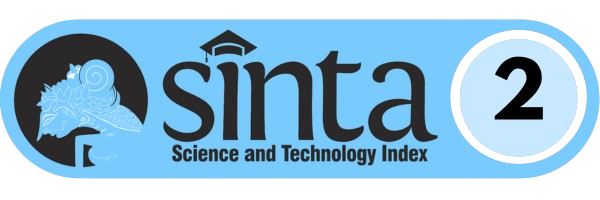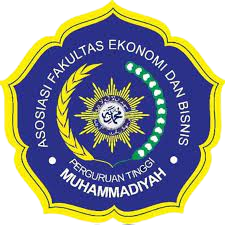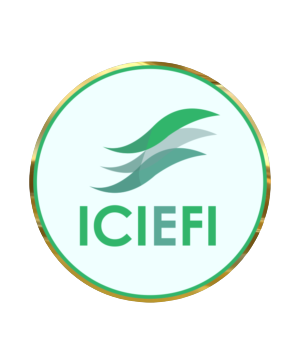Impacts of Sanitation Practices on Human Development: A Decade-Long Analysis of the Malang District
DOI:
https://doi.org/10.24269/ekuilibrium.v19i2.2024.pp276-288Abstract
This study explores the influence of various sanitation practices on the Human Development Index (HDI) in the Malang District from 2011 to 2020. Employing a multiple linear regression analysis, the research examines the relationship between the HDI and five critical sanitation practices: access to wastewater treatment plants, open defecation prevalence, septic tank usage, and direct waste disposal into water bodies and onto land. Secondary data was sourced from the Badan Pusat Statistika of Malang District, ensuring robust and authoritative information spanning over a decade. Preliminary diagnostics were performed to affirm the data's suitability for regression analysis. The results indicated a significant negative impact of direct disposal into water bodies on HDI, emphasizing the critical role of effective waste management practices in promoting human development. The study underscores the need for integrated policy approaches that address sanitation infrastructure improvements, environmental protection, and education on public health practices. This paper contributes to the literature by quantifying the effects of sanitation on human development over an extended period. It offers evidence-based recommendations for policymakers to support sustainable development goals in the region.
References
Abudulai, I., Abdulai Robert Aziz, T., Ofori, B., & Atta Adjei, G. (2021). The Menace of Open Defecation in Ghanaian Communities: The Case of Gambaga and Nalerigu Communities in North East Region. International Journal of Environmental Protection and Policy, 9(2), 16. https://doi.org/10.11648/j.ijepp.20210902.11
Aminu, F. O., & Udeze, E. (2023). Relationship Between Water, Sanitation, Hygiene Practices and The Incidence of Water Borne Diseases Among Urban Slum Households in Lagos State, Nigeria. Journal of Agriculture, Food, Environment and Animal Sciences, 4(1), 1–20.
Badan Pusat Statistika of Malang District. (2021). Persentase Rumah Tangga di Malang District Menurut Tempat Pembuangan Akhir Tinja, 2011-2020. Badan Pusat Statistik. https://malangkab.bps.go.id/
Chakraborty, P., Vinod, P. G., Syed, J. H., Pokhrel, B., K Bharat, G., Basu, A. R., Fouzder, T., Pasupuleti, M., Urbaniak, M., & Beskoski, V. P. (2022). Water-sanitation-health nexus in the Indus-Ganga-Brahmaputra River Basin: need for wastewater surveillance of SARS-CoV-2 for preparedness during the future waves of pandemic. Ecohydrology & Hydrobiology, 22(2), 283–294. https://doi.org/https://doi.org/10.1016/j.ecohyd.2021.11.001
Dhrifi, A., Alnahdi, S., & Jaziri, R. (2021). The causal links among economic growth, education and health: Evidence from developed and developing countries. Journal of the Knowledge Economy, 12(3), 1477–1493.
Donkor, F. K., & Chitakira, M. (2022). Nexus of water, sanitation, and hygiene (WASH) and sustainable development goals. In Clean Water and Sanitation (pp. 453–461). Springer.
Drenning, P., Volchko, Y., Ahrens, L., Rosén, L., Söderqvist, T., & Norrman, J. (2023). Comparison of PFAS soil remediation alternatives at a civilian airport using cost-benefit analysis. Science of the Total Environment, 882, 163664.
Erku, D., Khatri, R., Endalamaw, A., Wolka, E., Nigatu, F., Zewdie, A., & Assefa, Y. (2023). Community engagement initiatives in primary health care to achieve universal health coverage: A realist synthesis of scoping review. Plos One, 18(5), e0285222.
Francois, J. N. D., Gyimah-Brempong, K., Kakeu, J., & Kouame, C. S. (2023). The People’s Voice and Access to Sanitation. The World Bank.
Gaies, B. (2022). Reassessing the impact of health expenditure on income growth in the face of the global sanitary crisis: the case of developing countries. The European Journal of Health Economics, 23(9), 1415–1436. https://doi.org/10.1007/s10198-022-01433-1
Gravitiani, E., & Juwita, A. H. (2020). Externalities of Waste Dis-amenities, Benefit Transfer Application on Piyungan and Putri Cempo Landfill, Indonesia. Ekuilibrium: Jurnal Ilmiah Bidang Ilmu Ekonomi, 15, 180-187. https://doi.org/10.24269/ekuilibrium.v15i2.2020.pp180-187
Habanyama, M., Kabika, J., & Mwiinga, L. (2024). Effects of Climate Change-Induced Flooding on Onsite Sanitation Services: A Case Study of Kanyama, Compound in Lusaka, Zambia. African Journal of Climate Change and Resource Sustainability, 3(1), 98–115.
Hussain, Z., Mehmood, B., Khan, M. K., & Tsimisaraka, R. S. M. (2022). Green growth, green technology, and environmental health: evidence from high-GDP countries. Frontiers in Public Health, 9, 816697.
Jilcha, K. (2020). Workplace innovation for social sustainable development. In Sustainable Organizations-Models, Applications, and New Perspectives. IntechOpen.
Khan, S. A. R., Zhang, Y., Kumar, A., Zavadskas, E., & Streimikiene, D. (2020). Measuring the impact of renewable energy, public health expenditure, logistics, and environmental performance on sustainable economic growth. Sustainable Development, 28(4), 833–843.
Kumar, R., Verma, A., Shome, A., Sinha, R., Sinha, S., Jha, P. K., Kumar, R., Kumar, P., Shubham, Das, S., Sharma, P., & Vara Prasad, P. V. (2021). Impacts of Plastic Pollution on Ecosystem Services, Sustainable Development Goals, and Need to Focus on Circular Economy and Policy Interventions. In Sustainability (Vol. 13, Issue 17). https://doi.org/10.3390/su13179963
Maket, I., Kanó, I. S., & Vas, Z. (2024). Quality of urban infrastructural service accessibility and human well-being in Sub-Saharan Africa. World Development Sustainability, 4, 100155. https://doi.org/https://doi.org/10.1016/j.wds.2024.100155
Mihai, F.-C., Gündoğdu, S., Markley, L. A., Olivelli, A., Khan, F. R., Gwinnett, C., Gutberlet, J., Reyna-Bensusan, N., Llanquileo-Melgarejo, P., Meidiana, C., Elagroudy, S., Ishchenko, V., Penney, S., Lenkiewicz, Z., & Molinos-Senante, M. (2022). Plastic Pollution, Waste Management Issues, and Circular Economy Opportunities in Rural Communities. In Sustainability (Vol. 14, Issue 1). https://doi.org/10.3390/su14010020
Mishra, B. K., Kumar, P., Saraswat, C., Chakraborty, S., & Gautam, A. (2021). Water Security in a Changing Environment: Concept, Challenges and Solutions. In Water (Vol. 13, Issue 4). https://doi.org/10.3390/w13040490
Nawaz, M. U., Qureshi, M. S., & Umar, S. (2024). Integration of Solar Energy Systems with Electric Vehicle Charging Infrastructure: Challenges and opportunity. Revista Espanola de Documentacion Cientifica, 18(02), 1–18.
Öberg, G., Metson, G. S., Kuwayama, Y., & A. Conrad, S. (2020). Conventional Sewer Systems Are Too Time-Consuming, Costly and Inflexible to Meet the Challenges of the 21st Century. In Sustainability (Vol. 12, Issue 16). https://doi.org/10.3390/su12166518
Onyango, P. O. (2023). Sanitation Context and Technological Challenges to Municipal Wastewater Management in Africa. In Wastewater Management and Technologies (pp. 183–191). Springer.
Pereira, M. A., & Marques, R. C. (2022). The ‘Sustainable Public Health Index’: What if public health and sustainable development are compatible? World Development, 149, 105708. https://doi.org/https://doi.org/10.1016/j.worlddev.2021.105708
Pratama, Y. P., Samudro, B. R., & Yogi, A. P. (2018). Breastfeeding: Gender and Socio-Economic Dimensions. Ekuilibrium: Jurnal Ilmiah Bidang Ilmu Ekonomi, 13, 67-84. https://doi.org/10.24269/ekuilibrium.v13i1.2018.pp67-84
Raghupathi, V., & Raghupathi, W. (2020). Healthcare Expenditure and Economic Performance: Insights From the United States Data. Frontiers in Public Health, 8. https://www.frontiersin.org/journals/publichealth/articles/10.3389/fpubh.2020.00156
Rahman, M. H. U., Malik, M. A., Chauhan, S., Patel, R., Singh, A., & Mittal, A. (2020). Examining the linkage between open defecation and child malnutrition in India. Children and Youth Services Review, 117, 105345. https://doi.org/https://doi.org/10.1016/j.childyouth.2020.105345
Rasmussen, L. V., Fold, N., Olesen, R. S., & Shackleton, S. (2021). Socio-economic outcomes of ecological infrastructure investments. Ecosystem Services, 47, 101242. https://doi.org/https://doi.org/10.1016/j.ecoser.2020.101242
Rizal, M., Sagara, N., Sari, M. M., Septiariva, I. Y., & Wayan, I. (2022). Relationship between Human Development Index and Gross Regional Domestic Product on Sanitation Access in East Java Region in Achieving Sustainable Development Goals. Jurnal Perencanaan Pembangunan: The Indonesian Journal of Development Planning, VI(2), 267–276.
RodrÃguez, C., Florido, C., & Jacob, M. (2020). Circular Economy Contributions to the Tourism Sector: A Critical Literature Review. In Sustainability (Vol. 12, Issue 11). https://doi.org/10.3390/su12114338
Sumarsono, H. (2016). Faktor-faktor yang mempengaruhi intensi wirausaha mahasiswa universitas muhammadiyah ponorogo. Ekuilibrium: Jurnal Ilmiah Bidang Ilmu Ekonomi, 8(1), 62-88. https://doi.org/10.24269/ekuilibrium.v8i1.2013.pp62 - 88
Suryawan, I. W. K., & Lee, C.-H. (2023). Citizens’ willingness to pay for adaptive municipal solid waste management services in Jakarta, Indonesia. Sustainable Cities and Society, 97. https://doi.org/https://doi.org/10.1016/j.scs.2023.104765
Suryawan, I. W. K., Sianipar, I. M. J., & Lee, C.-H. (2024). Reshaping marine debris management post-COVID-19: Integrating adaptive attributes for enhanced community engagement. Ocean & Coastal Management, 253, 107149. https://doi.org/https://doi.org/10.1016/j.ocecoaman.2024.107149
Taufique, M., Ansari, N., & Hoque, M. A. (2020). Open Defecation and Poor Sanitation Condition a Serious Menace to Human Health and Dignity: A Micro Level Analysis of Indian Villages.
Umair, M., Ahmad, W., Hussain, B., Fortea, C., Zlati, M. L., & Antohi, V. M. (2024). Empowering Pakistan’s Economy: The Role of Health and Education in Shaping Labor Force Participation and Economic Growth. In Economies (Vol. 12, Issue 5). https://doi.org/10.3390/economies12050113
Willetts, J., Mills, F., & Al’Afghani, M. (2020). Sustaining Community-Scale Sanitation Services: Co-management by Local Government and Low-Income Communities in Indonesia . In Frontiers in Environmental Science (Vol. 8). https://www.frontiersin.org/articles/10.3389/fenvs.2020.00098
Downloads
Published
How to Cite
Issue
Section
License
Retained Rights/Terms and Conditions of Publication
1. As an author you (or your employer or institution) may do the following:
- make copies (print or electronic) of the article for your own personal use, including for your own classroom teaching use;
- make copies and distribute such copies (including through e-mail) of the article to research colleagues, for the personal use by such colleagues (but not commercially or systematically, e.g. via an e-mail list or list server);
- present the article at a meeting or conference and to distribute copies of the article to the delegates attending such meeting;
- for your employer, if the article is a ‘work for hire’, made within the scope of your employment, your employer may use all or part of the information in the article for other intra-company use (e.g. training);
- retain patent and trademark rights and rights to any process, procedure, or article of manufacture described in the article;
- include the article in full or in part in a thesis or dissertation (provided that this is not to be published commercially);
- use the article or any part thereof in a printed compilation of your works, such as collected writings or lecture notes (subsequent to publication of the article in the journal); and prepare other derivative works, to extend the article into book-length form, or to otherwise re-use portions or excerpts in other works, with full acknowledgement of its original publication in the journal;
- may reproduce or authorize others to reproduce the article, material extracted from the article, or derivative works for the author's personal use or for company use, provided that the source and the copyright notice are indicated, the copies are not used in any way that implies RCEPM-LIPI endorsement of a product or service of any employer, and the copies themselves are not offered for sale.
All copies, print or electronic, or other use of the paper or article must include the appropriate bibliographic citation for the article's publication in the journal.
2. Requests from third parties
Although authors are permitted to re-use all or portions of the article in other works, this does not include granting third-party requests for reprinting, republishing, or other types of re-use. Requests for all uses not included above, including the authorization of third parties to reproduce or otherwise use all or part of the article.
3. Author Online Use
- Personal Servers. Authors and/or their employers shall have the right to post the accepted version of articles pre-print version of the article, or revised personal version of the final text of the article (to reflect changes made in the peer review and editing process) on their own personal servers or the servers of their institutions or employers without permission from Universitas Muhamamdiyah Ponorogo, provided that the posted version includes a prominently displayed Universitas Muhamamdiyah Ponorogo copyright notice and, when published, a full citation to the original publication, including a link to the article abstract in the journal homepage. Authors shall not post the final, published versions of their papers;
- Classroom or Internal Training Use. An author is expressly permitted to post any portion of the accepted version of his/her own articles on the author's personal web site or the servers of the author's institution or company in connection with the author's teaching, training, or work responsibilities, provided that the appropriate copyright, credit, and reuse notices appear prominently with the posted material. Examples of permitted uses are lecture materials, course packs, e-reserves, conference presentations, or in-house training courses;
- Electronic Preprints. Before submitting an article to an Ekuilibrium: Jurnal Ilmiah Bidang Ilmu Ekonomi, authors frequently post their manuscripts to their own web site, their employer's site, or to another server that invites constructive comment from colleagues. Upon submission of an article to Ekuilibrium: Jurnal Ilmiah Bidang Ilmu Ekonomi, an author is required to transfer copyright in the article to Economy Faculty Universitas Muhammadiyah Ponorogo, and the author must update any previously posted version of the article with a prominently displayed Economy Faculty Universitas Muhammadiyah Ponorogo copyright notice. Upon publication of an article by the Universitas Muhammadiyah Ponorogo, the author must replace any previously posted electronic versions of the article with either (1) the full citation to the work with a Digital Object Identifier (DOI) or link to the article abstract in Ekuilibrium: Jurnal Ilmiah Bidang Ilmu Ekonomi journal homepage, or (2) the accepted version only (not the final, published version), including the Economy Faculty Universitas Muhammadiyah Ponorogo copyright notice and full citation, with a link to the final, published article in journal homepage.
4. Articles in Press (AiP) service
Economy Faculty Universitas Muhammadiyah Ponorogo may choose to publish an abstract or portions of the paper before we publish it in the journal. Please contact our Production department immediately if you do not want us to make any such prior publication for any reason, including disclosure of a patentable invention.
5. Author/Employer Rights
If you are employed and prepared the article on a subject within the scope of your employment, the copyright in the article belongs to your employer as a work-for-hire. In that case, Economy Faculty Universitas Muhammadiyah Ponorogo assumes that when you sign this Form, you are authorized to do so by your employer and that your employer has consented to the transfer of copyright, to the representation and warranty of publication rights, and to all other terms and conditions of this Form. If such authorization and consent has not been given to you, an authorized representative of your employer should sign this Form as the Author.
6. RCEPM-LIPI Copyright Ownership
It is the formal policy of Economy Faculty Universitas Muhammadiyah Ponorogo to own the copyrights to all copyrightable material in its technical publications and to the individual contributions contained therein, in order to protect the interests of the Economy Faculty Universitas Muhammadiyah Ponorogo, its authors and their employers, and, at the same time, to facilitate the appropriate re-use of this material by others. Economy Faculty Universitas Muhammadiyah Ponorogo distributes its technical publications throughout the world and does so by various means such as hard copy, microfiche, microfilm, and electronic media. It also abstracts and may translate its publications, and articles contained therein, for inclusion in various compendiums, collective works, databases and similar publication.
7. Licensing Terms
Ekuilibrium is licensed under a Creative Commons Attribution-ShareAlike 4.0 International License.
Permissions beyond the scope of this license may be available at https://journal.umpo.ac.id/











